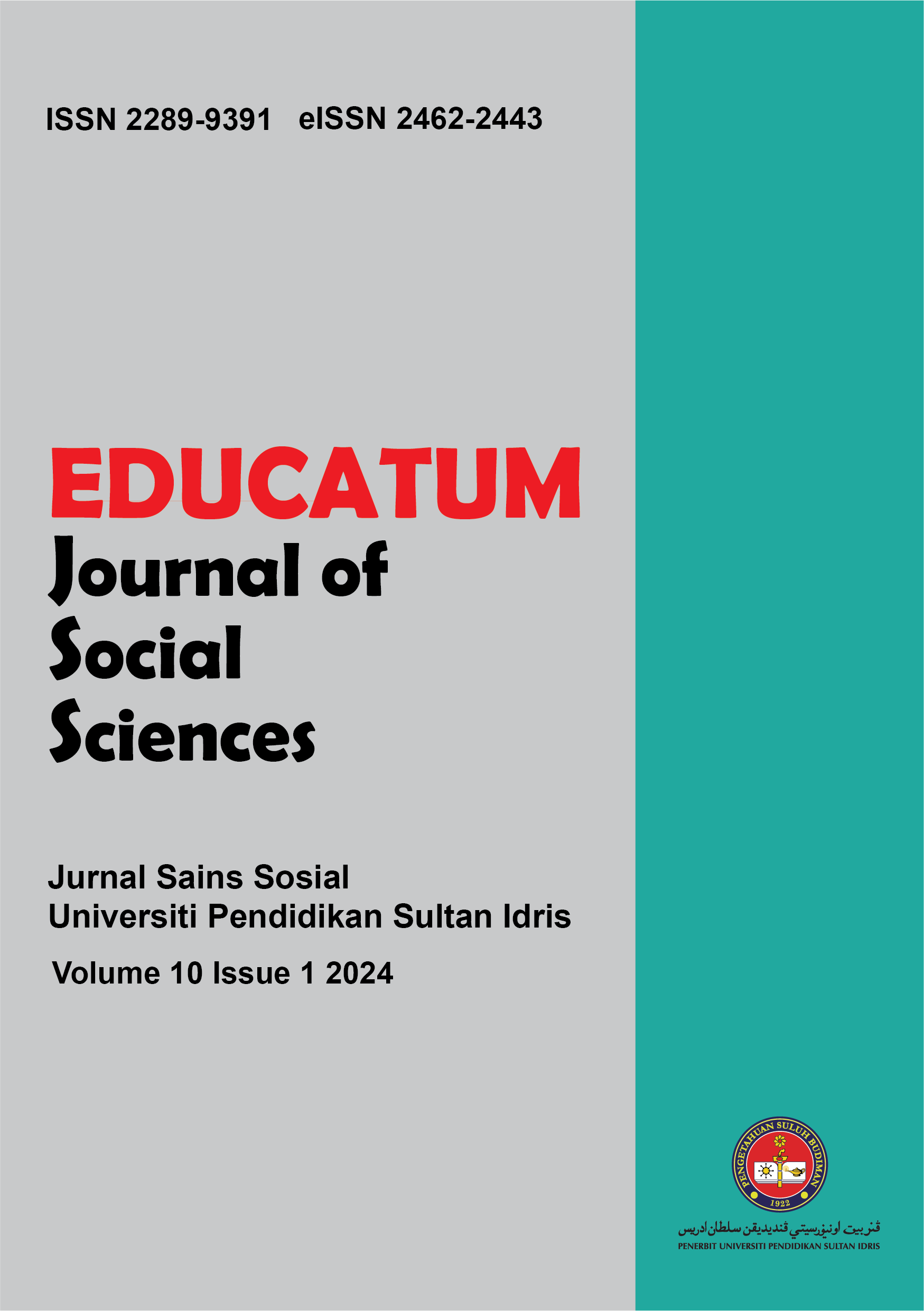Ecocritical Reading of Land and Landscape in Muhammad Haji Salleh’s Rowing Down Two Rivers: An eco-consciousness approach
DOI:
https://doi.org/10.37134/ejoss.vol10.1.2.2024Keywords:
Ecocriticism, Landscape, Ecocentrism, Interconnectedness, Symbiotic, IntrinsicAbstract
The Malaysian National Laureate Muhammad Haji Salleh has always been true to his green roots. Even when things are hard, he finds comfort and interest in Motherland's embrace. This paper is aimed to highlight the identity-land symbiotic interconnectedness in Muhammad Haji Salleh’s selected poems through the lens of ecocriticism. In the selected poems we examined the concept of eco-consciousness with the purpose of to better understand how Muhammad Haji Salleh view the concept of personal identity as intrinsically tied to the natural world. Upon detailed analysis of the selected poems, it becomes evident that Muhammad Haji Salleh has never ceased preaching about the plight of the Malaysian land and landscape and the urgent need for worldwide attention. His poetry proves that he utilizes the land and landscape as an iconic form of aspiration and even ecocritically functional and through the application of the concept of eco-consciousness, the researchers conclude that while there are strong and deep connections between humans and their land and landscape, this does not change the fact that humans are more dependent towards nature than vice-versa. The researchers believe that reading more poems by Muhammad Haji Salleh and other Malaysian poets will produce a better and more thorough finding for future research on the topic of the inextricable connection between individual identity and the natural world. Thus, this study shows the implications of developing Malaysian ecocriticism as a means to read literature and to understand the significance of the land-identity attachment in the psyche of Malaysians.
Downloads
References
Chin, C. (2007). EFL learners’ perceptions on English writing tasks and teacher feedback. https://koreascience.kr/article/JAKO200717357306174.page
Figueiredo, M. D., & Marquesan, F. F. S. (2022). Radical ecocentrism or greening business? A review of the organization-nature relation on Paul Shrivastava’s contributions to the Organizational Theory. XI Encontro De Estudos Organizacionais Da ANPAD.
Gudmanian, A., Drotianko, L., Shostak, O., Kleshnia, H., & Ordenov, S. (2020). Transformation of ecological consciousness in the process of solving global ecological problems. E3S Web of Conferences, 175. https://doi.org/10.1051/e3sconf/202017514017
James, E., & Morel, E. (2018). Ecocriticism and Narrative Theory: An Introduction. English Studies, 99(4), 355–365. https://doi.org/10.1080/0013838x.2018.1465255
Lehtonen, A., Salonen, A. O., Cantell, H., & Riuttanen, L. (2018). A pedagogy of interconnectedness for encountering climate change as a wicked sustainability problem. Journal of Cleaner Production, 199, 860–867. https://doi.org/10.1016/j.jclepro.2018.07.186
Mazel, D. (2001). A century of early ecocriticism. In University of Georgia Press eBooks. http://ci.nii.ac.jp/ncid/BA51235694
Mishra, S. K. (2016). Ecocriticism: A Study of Environmental Issues in Literature. BRICS Journal of Educational Research, 6(4), 168–170.
Quayum, M. A. (2020). Malaysian literature in English: A Critical Companion. Cambridge Scholars Publishing.
Siwi, P., Arafah, B., Wulan, S., Purwarno, P., Ekalestari, S., & Arafah, A. N. B. (2022). Treatment of Nature: An Ecocriticism approach in ‘Komat Kamit’ of Tejo and Kamba’s Tuhan Maha Asik. Theory and Practice in Language Studies, 12(7), 1278–1285. https://doi.org/10.17507/tpls.1207.05
Visions of eco-apocalypse in selected Malaysian poetry in English: Cecil Rajendra and Muhammad Haji Salleh - UM Research Repository. (n.d.). https://eprints.um.edu.my/9240/
Yaapar, M. S. (2013). Si Tenggang in the Postcolonial Arena: A Search for Identity and Sustainability in the Works of Muhammad Haji Salleh. Malay Literature, 26(2), 154–181. https://jurnal.dbp.my/index.php/MalayLiterature/article/view/5359
Yahya, Wan, Barani, Forough, Termizi, Ali, Rahman, & Abdul. (2010). Cultural Identity Past and Present: Poetic Imagination of Muhammad Haji Salleh. International Journal of the Humanities, 7(12).
Yahya, Z. (2000). Si Tenggang’s Homecoming: Negotiating tradition and modernity. Indonesia and the Malay World, 28(80), 22–31.
Zainal, Z. I. (2021). Landscape of Loss: Poems on Lake Chini. Journal of Southeast Asian Ecocriticism, 1(1).
Downloads
Published
How to Cite
Issue
Section
License
Copyright (c) 2024 Nurul Huda Abdul Hamid, Hamoud Yahya Ahmed Mohsen

This work is licensed under a Creative Commons Attribution-NonCommercial-ShareAlike 4.0 International License.





